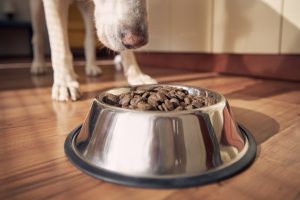
A-dog-vomiting
Has your dog recently started vomiting, not eating, or becoming nauseous? It could be indigestion or gastroenteritis (the latter is more likely if accompanied by diarrhea). This in itself is not a bad thing. If it is transient and does not bleed, it can be treated at home. Here are some home remedies for dogs vomiting.
What Causes Dogs to Vomit?
Dog vomiting can be caused by viral or bacterial infections, parasitic infections (e.g., worms), food allergies or intolerances, toxic foods, and indigestion. The first three cause chronic vomiting and diarrhea and require taking the dog to the vet as soon as possible.
The last two, toxic and indigestible foods, result from the dog eating something it should not eat or becoming angry. If this is the case, you can treat it at home.
What Home Remedies Are Available for Vomiting in Dogs?
Several home remedies for dog vomiting can treat gastroenteritis and indigestion. If these remedies do not improve or make it worse, take your dog to the vet without delay as he may be “stuck” with an infection, allergy, or ingested something he cannot digest.
1) Fasting
If something has upset their stomach, the best thing to do is to help get rid of it and not put any more stuff in their stomach.
Do not feed anything for 12 hours, then start giving one-eighth of his usual food, and if he does not refuse, gradually increase the amount at each meal over 2-3 days until he returns to his usual amount.
2) Yogurt
Yogurt is a good remedy. Dogs, like humans, have benign bacteria in their small intestines that aid in digestion. In severe diarrhea and vomiting, these bacteria are excreted and lost. Yogurt helps replenish those bacteria.
3) Soft Diet
Human food should never be avoided. Healthy dogs can consume these foods without problems, but they will have difficulty digesting them if they have gastrointestinal issues. After fasting, it’s better to feed them stimulating foods such as white rice (no spices).
4) Water
Give them lots of water but in a controlled manner every hour. Vomiting and diarrhea result in large amounts of water loss, which must be replaced. If they cannot swallow well, one option is to give them water with ice, also satisfying their appetite for chewing.
5) Infusion
Infusions of licorice, chamomile, ginger, rice, and mint are also good choices. Give them 3 tablespoons twice daily. If they vomit again, it is essential to monitor their behavior as it is best to discontinue use.
Danger Signals
It is essential to monitor your dog’s health and progress during this problem. Any home medication can be administered as long as the vomiting stops and does not recur. However, if any of the following symptoms are observed, consult your veterinarian:
Poisoning: If you find that the symptoms are due to ingestion of a toxic substance, consult your veterinarian immediately.
Other symptoms appear: It is normal for the stomach to become lethargic. However, if fever, cramps, or worsening of the main symptoms occur, professional help should be sought.
Blood in vomit: Blood indicates that something serious may be happening in the body. Home remedies for dog vomiting are not enough to cure your pet.
Presence of diarrhea: Vomiting extensively dehydrates the animal and, together with diarrhea, can be a significant health risk.
It does not improve in the first 24 hours: Note that occasional vomiting usually recovers rapidly and progresses. If there are no signs of this, it is best to visit the veterinarian for prevention. Time is critical to avoid dehydration.

Let us know if these few tips have helped you in the comments below!







